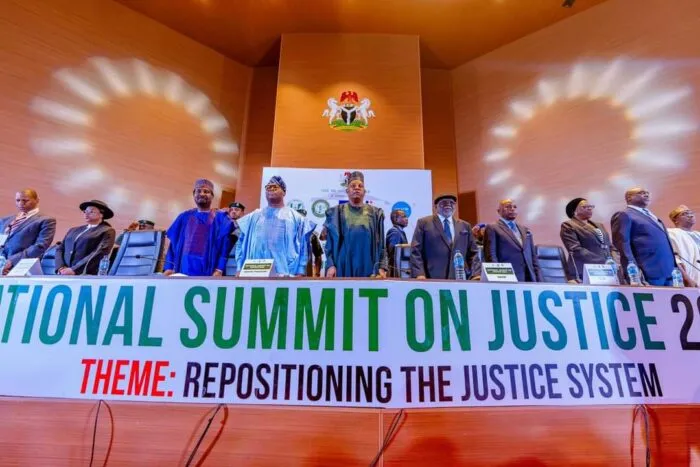
A two-day National Summit on Justice 2024 has ended with the adoption of a revised National Policy on Justice 2024–2028, which outlines a roadmap for significant reforms inc for effective administration of justice.
The chairman of the planning committee of the summit, Dr Babatunde Ajibade (SAN), disclosed this on Friday in Abuja while addressing newsmen at the end of the summit with the theme, “Repositioning the Justice System: Constitutional, Statutory, and Operational Reforms for Access and Efficiency.”
The chairman of the planning committee of the summit said the National Policy on Justice 2024–2028 will serve as a roadmap, paving the way for a more efficient, equitable, and responsive justice system for all Nigerians.
Ajibade, who gave highlights on panel discussions at the various technical sessions, said the summit narrowed down its discussions on reforms in the judicial sector of the country.
He said the first priority area discussed at the technical sessions was the judicial appointment process. This was because the Summit believed that the issue was a fundamental matter that needed to be adequately addressed if the country was to get it right.
He said, “Because if we don’t get the judicial appointment right, it will be difficult to build anything significant on top of that.”
Another area that panellists at the technical session during the summit looked at was the area of funding, adding that “if we don’t get the funding and budget administration of the courts right, it will be difficult to get the courts to function effectively.
“The third priority area is the eradication of the delay in the administration of justice in the country. If you don’t get the right judicial officers, if they are not properly funded, if there is no sufficient number of them, if the administration of the courts is not proper, there is no way you can get efficient and quick justice delivery, which the constitution promises,” the senior lawyer stated.
Answering questions from newsmen at the end of the briefing, Dr Ajibade said that the issue of the unbundling of the Supreme Court was not one of the priority areas discussed at the summit but that “we are looking at reducing the workload of the Supreme Court by limiting the number of cases that come up to the Supreme Court.”
While noting that the country’s apex court is one of the busiest Supreme Courts in the world, with cases between landlords and tenants going up to it.
“The Supreme Court is too busy; our focus is not unbundling the Supreme Court but reducing the workload and making sure that the court performs its true role as the apex court in the land,” he said, adding that the participation of all stakeholders required to make the necessary changes gives hope for the desired reforms of the judiciary of the country.
According to the learned silk, Fagbemi, the current AGF and Minister of Justice, has every intention to pursue the reform initiatives of the judiciary to a logical conclusion within the shortest possible time.
At the opening ceremony of the summit on Wednesday, President Bola Tinubu, President of the Senate, Godswill Akpabio, and Fagbemi expressed the determination of the present administration to give a fresh direction to the justice sector in the country through a holistic overhaul of the sector.
The president, Tinubu, represented by the vice president, Alhaji Kashim Shettima, said the administration is committed to ensuring a just society that will support and encourage investments.
The president therefore directed all justice sector institutions to cue into the Renewed Hope Agenda of the Federal Government, which is targeted at repositioning and strengthening the justice sector to enhance access, transparency, accountability, fairness, and efficiency.
Akpabio, in his speech, recommended prompt and decisive punishment for judges found to have misused judicial powers in granting ex-parte orders in political matters.
He called on the National Judicial Council (NJC) to exercise stringent oversight over the activities of judges, adding that the Senate wants the NJC to establish clear and detailed standards governing the issuance of ex-parte orders, accompanied by a defined set of sanctions for violations.
He said the sanctions should be severe enough to serve as a deterrent against future abuses, and the NJC should conduct regular audits and reviews of ex-parte orders issued by judges to ensure compliance with established standards.
The Senate President assured of his commitment to ensuring that thoughtful and transformative justice reforms are seamlessly integrated into the ongoing amendments to the Constitution and the Electoral Act.
“This integration will not only fortify our constitution and electoral framework but will also ensure that justice—both in letter and in spirit—becomes more attainable for every Nigerian”.
In his speech, Fagbemi said the Federal Government is committed to fashioning a clear strategy that will reposition and strengthen the justice sector for greater access, transparency, accountability, fairness, and efficiency in the entrenchment of the rule of law in Nigeria and the administration of justice in general.
The AGF said one of the cardinal items of the Renewed Hope Agenda of the present administration is to drive judicial reforms to achieve sustainable socio-economic growth and investment, facilitated by the rule of law, and to address the challenges militating against judicial development in the country.
“The justice sector under my watch will continue to push for mutuality in the formulation and implementation of the National Policy on Justice and the National Judicial Policy.
“In furtherance of the above, we are developing draft constitution amendment bills that are aimed at achieving the aims of improved access to justice, deepening the independence and capacity of the judiciary, and eliminating delays in the administration of justice, among others,” the AGF said.
The keynote speaker and former Chief Justice of Kenya, Dr Willy Mutunga, said in his speech that Nigeria’s constitution needs to be overhauled and that the country’s judicial system should be reformed to enable people to have access to the court.
ALSO READ THESE TOP STORIES FROM NIGERIAN TRIBUNE
Source: